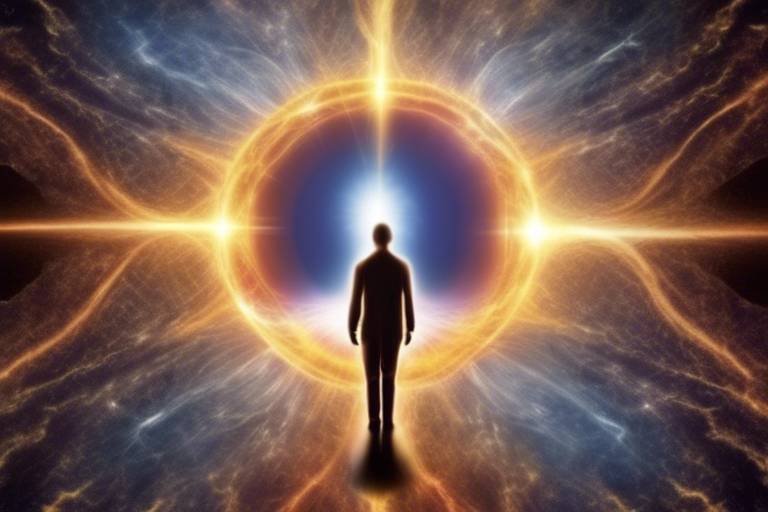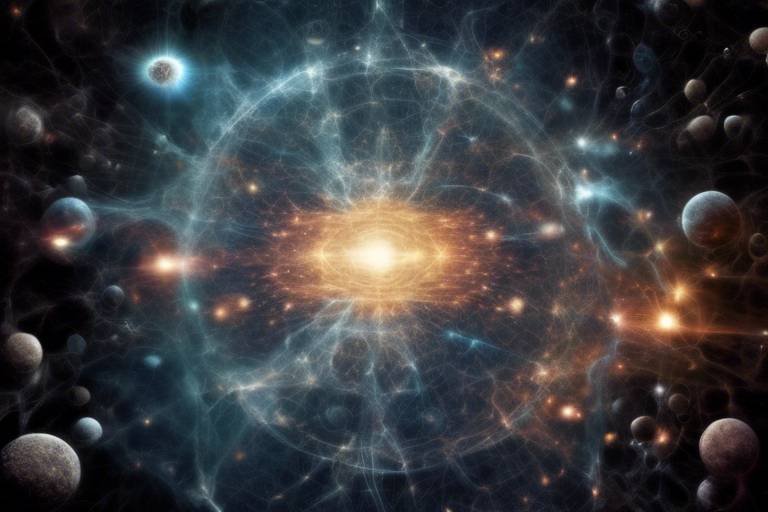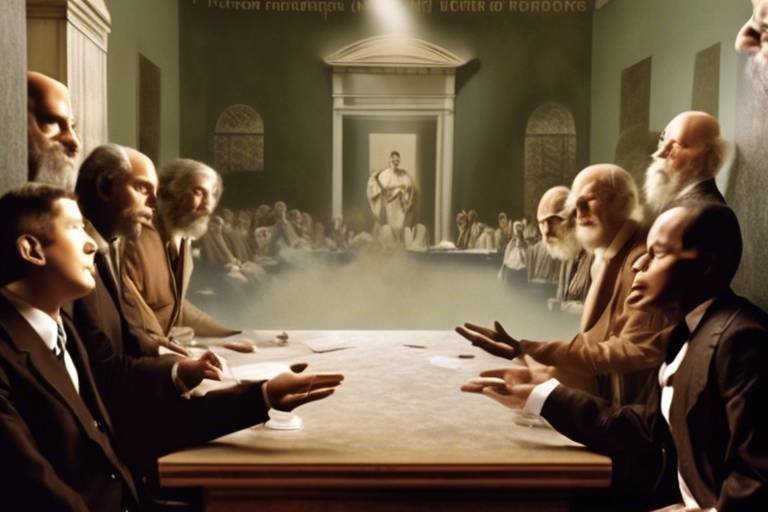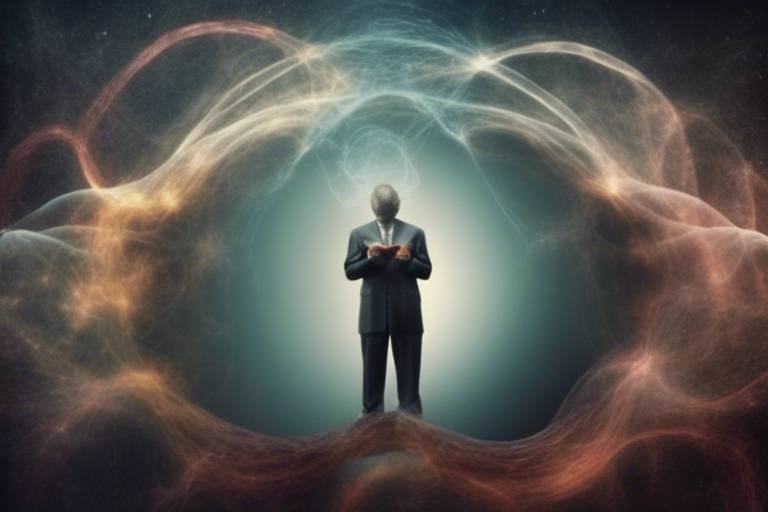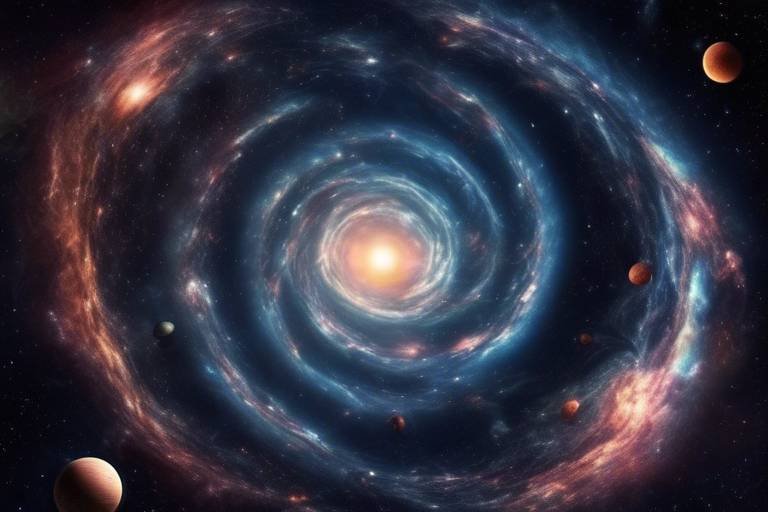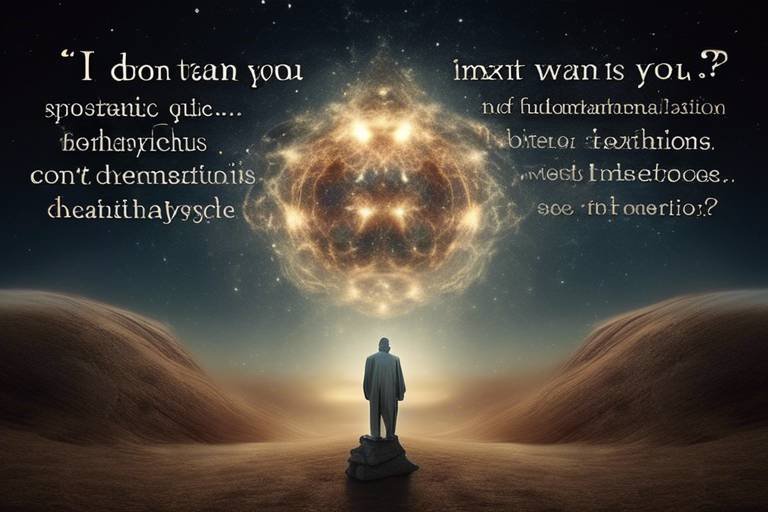The Impact of Quantum Physics on Metaphysics
Have you ever pondered the nature of reality and existence? If so, you're not alone. For centuries, philosophers and scientists alike have grappled with profound questions about what it means to be alive, what constitutes reality, and how consciousness plays a role in our understanding of the universe. Enter quantum physics, a field that has not only revolutionized our understanding of the microscopic world but also poses significant challenges to traditional metaphysical views. This article will explore how the advancements in quantum theory are reshaping our understanding of reality, existence, and consciousness.
At its core, quantum physics reveals a universe that is far more complex and enigmatic than we ever imagined. Concepts such as superposition and entanglement defy our everyday experiences and challenge the classical mechanics that have long dominated our understanding of physics. These principles open up a Pandora's box of metaphysical implications, suggesting that reality may not be as straightforward as we once thought. Instead of a deterministic universe where everything follows a clear cause-and-effect chain, quantum physics introduces a level of unpredictability that forces us to reconsider our philosophical assumptions.
As we delve deeper into the intersection of quantum physics and metaphysics, we will examine how these scientific advancements not only challenge our understanding of the physical world but also invite us to rethink the very nature of existence and consciousness. Are we merely observers in a universe governed by strict laws, or is our consciousness intertwined with the fabric of reality itself? Buckle up, because this journey into the quantum realm is sure to surprise and enlighten!

Understanding Quantum Physics
Quantum physics, often regarded as one of the most revolutionary fields of science, delves into the behavior of matter and energy on the smallest scales. Unlike classical physics, which describes the macroscopic world we experience daily, quantum physics introduces a realm where the rules seem almost bizarre. Imagine a world where particles can exist in multiple states at once, or where two particles can be instantaneously connected, no matter how far apart they are. These phenomena are encapsulated in fundamental principles such as superposition and entanglement, which challenge our traditional understanding of reality.
At its core, quantum physics suggests that the universe is not as deterministic as we once thought. In classical mechanics, if you know the position and velocity of an object, you can predict its future state with absolute certainty. However, quantum mechanics introduces a level of unpredictability. For instance, the famous double-slit experiment illustrates this beautifully. When particles, like electrons, are fired at a barrier with two slits, they create an interference pattern, indicating that each particle behaves like a wave, passing through both slits simultaneously. It’s only when we observe the particles that they 'decide' on a specific path. This leads us to question: what role does observation play in shaping reality?
Another key principle, entanglement, takes this idea further. When two particles become entangled, their states become linked, meaning the state of one particle instantly influences the state of the other, regardless of the distance separating them. This phenomenon has been described as 'spooky action at a distance' by Albert Einstein, who found it deeply unsettling. Entanglement raises profound questions about the nature of connections and relationships in the universe. Are we all, in some way, interconnected? Could our consciousness, thoughts, or actions influence the fabric of reality itself? These are not just scientific inquiries; they touch upon the very essence of our existence and how we relate to the universe.
In summary, quantum physics opens up a world that defies our intuitive understanding. It challenges the very foundations of how we perceive reality, existence, and even consciousness. As we venture deeper into this quantum realm, we begin to see how these scientific principles might have profound metaphysical implications, reshaping our understanding of what it means to be alive and aware in this complex universe.

Metaphysics: An Overview
Metaphysics is a branch of philosophy that delves into the fundamental nature of reality, existence, and the essence of being. It’s the realm where questions about what lies beyond the physical world are explored, inviting us to ponder concepts that often seem abstract and elusive. Think of metaphysics as the philosophical playground where the big questions reside: What is existence? What does it mean to be? How do we understand reality beyond our sensory experiences? These inquiries have intrigued thinkers for centuries, and their relevance continues to resonate in today’s philosophical discourse.
Historically, metaphysics has undergone significant evolution. In ancient times, philosophers like Aristotle laid the groundwork by categorizing different types of existence and exploring the nature of being. Fast forward to the Enlightenment, where metaphysical discussions were often intertwined with scientific advancements, leading to a richer understanding of the universe. Today, metaphysics intersects with various disciplines, including science, religion, and psychology, challenging us to rethink our perspectives on reality.
One of the core questions in metaphysics is the distinction between substance and attribute. Substance refers to what something fundamentally is, while attributes are the characteristics that describe it. For example, consider a tree: its substance is the tree itself, while its attributes include its height, color, and type of leaves. This distinction invites deeper reflection on how we categorize and understand the world around us.
Moreover, metaphysics often grapples with the concept of causality. The age-old question of whether everything has a cause or if some events occur spontaneously challenges our understanding of the universe. This leads us to consider the implications of free will versus determinism. Are we merely puppets of fate, or do we possess the agency to shape our destinies? These questions are not just philosophical musings; they have profound implications for ethics, personal responsibility, and our understanding of human nature.
In the context of modern discussions, metaphysics also touches on the nature of time and space. Are they absolute entities that exist independently of our perception, or are they constructs of human understanding? This debate has gained new momentum with advancements in physics, particularly quantum theory, which challenges traditional notions of how we perceive time and space. As we delve deeper into the realms of the universe, we find ourselves returning to these metaphysical questions, reminding us that the quest for understanding is as essential as the answers we seek.
Ultimately, metaphysics serves as a bridge between the known and the unknown, the tangible and the intangible. It invites us to explore the depths of existence and encourages a dialogue that transcends the limitations of empirical science. As we navigate through the complexities of life, metaphysics reminds us that some questions may not have clear answers, yet the journey of exploration itself is invaluable.
- What is metaphysics?
Metaphysics is a branch of philosophy that studies the fundamental nature of reality, existence, and the essence of being. - Why is metaphysics important?
Metaphysics helps us explore profound questions about existence and reality, shaping our understanding of the universe and our place within it. - How does metaphysics relate to quantum physics?
Metaphysics and quantum physics intersect in discussions about the nature of reality, causality, and consciousness, challenging traditional views and prompting new philosophical inquiries.

Quantum Mechanics vs. Classical Mechanics
When we dive into the world of physics, we often find ourselves caught in a fascinating tug-of-war between two seemingly opposing realms: quantum mechanics and classical mechanics. At first glance, classical mechanics, which governs the motion of everyday objects, seems intuitive and straightforward. Think of it as the rulebook for how a ball rolls down a hill or how a car accelerates on the highway. We can predict these movements with remarkable accuracy using Newton's laws of motion. However, when we step into the quantum realm, everything changes dramatically.
Quantum mechanics introduces us to a bizarre universe where particles can behave in ways that defy our everyday experiences. For instance, the concept of superposition suggests that particles can exist in multiple states at once, like a spinning coin that is both heads and tails until it lands. This idea is so counterintuitive that it challenges our fundamental understanding of reality. In contrast, classical mechanics operates under the assumption that objects have definite positions and velocities, a notion that seems almost comforting in its predictability.
Another key difference lies in the concept of entanglement. In classical mechanics, objects operate independently of one another. However, in the quantum world, particles can become entangled, meaning the state of one particle is directly linked to the state of another, no matter how far apart they are. Imagine having a pair of magic dice: when you roll one and it lands on a six, the other one, regardless of its location, instantly shows a six too. This phenomenon has profound implications, suggesting that our understanding of separation and individuality may need a serious overhaul.
To further illustrate the differences between these two frameworks, consider the following table:
| Aspect | Classical Mechanics | Quantum Mechanics |
|---|---|---|
| Nature of Objects | Definite position and velocity | Probabilistic state (superposition) |
| Interaction | Independent objects | Entangled particles |
| Determinism | Predictable outcomes | Uncertain outcomes |
| Measurement Effect | No effect on state | Measurement alters state |
This table highlights just a few of the fundamental differences between classical and quantum mechanics. As we explore these concepts, it becomes clear that the quantum world is not just a mere extension of classical physics but a completely different framework that challenges our most basic assumptions about reality. The implications of these differences stretch far beyond physics, inviting us to reconsider our philosophical ideas about existence and consciousness.
In essence, while classical mechanics provides a reliable guide to the macroscopic world, quantum mechanics opens the door to a realm where the rules are not just bent but completely rewritten. This transition from the familiar to the strange is what makes the study of quantum mechanics both thrilling and perplexing. It pushes us to question our understanding of the universe and beckons us to explore the deeper metaphysical implications of a reality that is far more complex than we ever imagined.

Superposition and Reality
The principle of superposition in quantum physics is nothing short of mind-bending. Imagine a coin spinning in the air; while it's in motion, it’s not just heads or tails, but a blend of both possibilities. This striking analogy encapsulates the essence of superposition, where particles exist in multiple states at once until they are observed. This challenges our traditional understanding of reality, which is often rooted in the idea that things are either one way or another. In the quantum realm, however, reality is more like a vibrant tapestry of potential outcomes, waiting for an observer to pull a thread and reveal a single path.
The implications of superposition extend far beyond the confines of physics; they ripple into the very fabric of metaphysics. If particles can exist in multiple states simultaneously, what does this mean for our understanding of existence itself? Are we, too, merely collections of probabilities, our lives unfolding in a multitude of ways until we make a choice? This perspective invites us to question the nature of reality: is it a fixed entity, or is it more fluid and dynamic, shaped by our perceptions and actions?
To further illustrate, consider the famous thought experiment known as Schrödinger's Cat. In this scenario, a cat is placed in a sealed box with a radioactive atom that has a 50% chance of decaying. Until someone opens the box to check, the cat is considered both alive and dead, existing in a state of superposition. This paradox not only highlights the strangeness of quantum mechanics but also raises profound questions about the nature of reality. Are we all living in our own boxes, experiencing a reality that is contingent upon observation?
Moreover, superposition challenges our intuitive grasp of causality. In classical physics, cause and effect are linear and predictable. However, in the quantum world, events can be interwoven in ways that defy logical reasoning. This leads us to ponder whether our understanding of time and space is merely a construct of our consciousness. If reality can exist in multiple forms simultaneously, then perhaps our perception of time as a straightforward progression is also an illusion.
As we delve deeper into the philosophical implications of superposition, we find ourselves at a crossroads between science and spirituality. The idea that reality is not a single, fixed entity but rather a spectrum of possibilities opens up new avenues for understanding existence, consciousness, and our place in the universe. It begs the question: if reality is shaped by observation, what role do we play in this grand cosmic play?
In summary, the principle of superposition not only revolutionizes our understanding of physics but also invites us to reconsider the very nature of reality. It challenges the boundaries of what we perceive and encourages a more nuanced exploration of existence itself. As our understanding of quantum mechanics evolves, so too does our perspective on life, urging us to embrace the uncertainty and complexity that comes with it.

Entanglement and Connection
Quantum entanglement is one of the most fascinating phenomena in quantum physics, where two or more particles become so deeply linked that the state of one instantly influences the state of another, no matter how far apart they are. This peculiar connection challenges our traditional notions of separateness and independence, raising profound metaphysical questions about the nature of reality and the relationships within it. Imagine a pair of gloves: if you find one glove in New York and the other in Tokyo, you instantly know the type of glove it is, even without being able to see or touch it. This analogy illustrates the essence of entanglement, where the properties of entangled particles are correlated in a way that defies classical understanding.
In metaphysical discourse, entanglement invites us to reconsider the concept of connection. If particles can be entangled across vast distances, what does that imply about our own relationships and interactions? Are we, too, interconnected in ways that transcend physical boundaries? This idea resonates with various philosophical traditions, suggesting that everything in the universe is fundamentally linked, echoing the sentiments of Eastern philosophies that emphasize unity and interconnectedness.
Moreover, entanglement challenges the classical view of locality, which posits that objects are only influenced by their immediate surroundings. In contrast, entangled particles exhibit a form of non-locality, where changes in one particle are felt in another instantaneously, regardless of the distance separating them. This phenomenon leads us to ponder whether our perceptions of space and time are merely illusions, and if the universe operates on a level that we have yet to fully comprehend.
To further explore these concepts, consider the following implications of quantum entanglement:
- Interconnectedness: Entanglement suggests that all entities in the universe may be interconnected, fostering a sense of unity.
- Redefining Relationships: Our understanding of relationships might extend beyond physical proximity, emphasizing emotional and spiritual bonds.
- Philosophical Paradigms: Traditional metaphysical frameworks may need reevaluation in light of quantum findings, challenging established beliefs about existence and reality.
As we delve deeper into the implications of entanglement, we find ourselves at the crossroads of science and philosophy. This intersection not only reshapes our understanding of the universe but also invites us to reflect on our place within it. Are we mere observers, or do we play an active role in the unfolding of reality? The answers may lie in the profound connections that bind us, much like the entangled particles that dance through the cosmos, forever linked in a tapestry of existence.
- What is quantum entanglement? Quantum entanglement is a phenomenon where two or more particles become interconnected in such a way that the state of one particle instantly influences the state of another, regardless of distance.
- How does entanglement challenge traditional views? It challenges the classical notions of separateness and locality, suggesting that particles can be connected in ways that defy our intuitive understanding of space and time.
- What are the implications of entanglement for metaphysics? It prompts a reevaluation of concepts such as interconnectedness, relationships, and the nature of reality, inviting philosophical discussions that bridge science and metaphysics.

Philosophical Implications of Quantum Theory
The advent of quantum theory has not only revolutionized our understanding of the physical universe but has also sparked profound philosophical debates that challenge our fundamental beliefs about existence, free will, and consciousness. At the heart of these discussions lies the question of determinism. In classical physics, the universe operates like a well-oiled machine, where every event is determined by preceding conditions. However, quantum mechanics introduces a level of unpredictability that suggests events may not be as predetermined as we once thought. This raises a tantalizing question: if the universe is not strictly deterministic, what does that mean for our understanding of free will?
Furthermore, quantum theory invites us to reconsider the nature of consciousness itself. Traditionally, consciousness has been viewed as a byproduct of physical processes in the brain. Yet, some interpretations of quantum mechanics imply that consciousness could play a role in shaping reality. This idea is embodied in the famous double-slit experiment, where the act of observation seems to influence the behavior of particles. Could it be that our consciousness is not just a passive observer but an active participant in the unfolding of reality? This notion challenges the materialistic worldview that has dominated scientific thought for centuries.
To delve deeper into these philosophical implications, let’s explore a few key concepts that arise from the intersection of quantum theory and metaphysics:
- Indeterminacy: Quantum mechanics suggests that not all events are predetermined, leading to discussions about the nature of causality and the role of chance in the universe.
- Observer Effect: The idea that observation affects outcomes raises questions about the relationship between consciousness and reality, suggesting a more interconnected existence.
- Non-locality: Quantum entanglement implies that particles can be connected across vast distances, challenging our understanding of separateness and individuality.
These concepts not only reshape our understanding of the physical world but also provoke critical reflections on our metaphysical beliefs. For instance, if consciousness can influence reality, what does that mean for our responsibilities and ethical considerations? Are we merely passive observers of a predetermined universe, or do we have the power to shape our destinies? These questions are not just academic; they touch upon the very essence of what it means to be human.
Moreover, the implications of quantum theory extend into the realm of spirituality. Many find resonance between quantum concepts and various spiritual philosophies that emphasize interconnectedness and the fluidity of reality. This convergence of science and spirituality invites a more holistic view of existence, one that acknowledges both the material and the immaterial aspects of life. As we explore these philosophical implications, we begin to realize that the boundaries between science, philosophy, and spirituality are not as rigid as we once believed.
In conclusion, the philosophical implications of quantum theory are vast and complex, challenging us to rethink our understanding of reality, existence, and consciousness. As we continue to unravel the mysteries of quantum mechanics, we are prompted to ask deeper questions about our place in the universe and the nature of our own consciousness. This exploration not only enriches our intellectual pursuits but also invites us to engage with the very fabric of existence itself.

Quantum Physics and Consciousness
Have you ever pondered the profound connection between quantum physics and consciousness? This intriguing relationship is at the forefront of some of the most exciting discussions in both scientific and philosophical circles today. As we delve into this topic, we find ourselves questioning the very fabric of reality and our place within it. Could it be that our consciousness is not merely a byproduct of biological processes but rather a fundamental aspect of the universe itself?
One of the most captivating theories in this realm is the Orch-OR theory (Orchestrated Objective Reduction), proposed by physicist Roger Penrose and anesthesiologist Stuart Hameroff. This theory posits that consciousness arises from quantum processes occurring within the microtubules of neurons. Imagine these microtubules as tiny quantum computers, orchestrating the symphony of our conscious experience. According to this view, consciousness is not just a passive observer of reality; it actively participates in shaping it. This perspective challenges the traditional materialistic view that consciousness is merely a byproduct of brain activity.
But what does this mean for our understanding of reality? If consciousness can influence quantum events, it suggests a universe that is far more interconnected and dynamic than we previously thought. In traditional physics, we often view the universe as a vast machine operating under strict laws. However, quantum mechanics introduces a level of unpredictability and interdependence that can reshape our understanding of existence itself.
To further illustrate this relationship, consider the following table that outlines key theories linking quantum physics and consciousness:
| Theory | Key Concepts | Implications |
|---|---|---|
| Orch-OR Theory | Quantum processes in microtubules | Consciousness influences reality |
| Quantum Mind Theory | Brain functions as a quantum computer | Consciousness is non-local |
| Many-Worlds Interpretation | Multiple realities coexist | Consciousness experiences different outcomes |
However, the notion that consciousness could be intertwined with quantum mechanics is not without its critics. Many in the scientific community remain skeptical, arguing that the brain's complexity is best understood through classical physics. They point out that while quantum effects may play a role at the microscopic level, translating these phenomena into the macroscopic world of human experience is fraught with challenges. The idea that our thoughts and perceptions could somehow collapse quantum states into reality raises more questions than answers.
Yet, this skepticism does not diminish the allure of exploring these ideas. The quest to understand the relationship between quantum physics and consciousness is akin to embarking on a journey into the unknown, where each discovery opens new doors and possibilities. It invites us to reconsider what it means to be conscious and how we interact with the universe.
In conclusion, the intersection of quantum physics and consciousness is a rich field of inquiry that challenges our preconceptions about reality. As we continue to explore these complex ideas, we might just uncover a deeper understanding of our existence and the universe at large. Are we merely observers, or are we active participants in the cosmic dance of reality? The answers may lie at the very heart of quantum mechanics.
- What is the Orch-OR theory? - It is a theory proposing that consciousness arises from quantum processes in the brain's microtubules.
- How does quantum physics relate to consciousness? - Some theories suggest that consciousness may influence quantum events, thereby shaping our reality.
- Are there critiques of linking quantum physics to consciousness? - Yes, many scientists argue that consciousness can be explained through classical physics without invoking quantum mechanics.

Quantum Consciousness Theories
When we dive into the intriguing realm of , we find ourselves at a fascinating crossroads of science and philosophy. One of the most notable theories is the Orch-OR theory, proposed by renowned physicist Roger Penrose and anesthesiologist Stuart Hameroff. This theory suggests that consciousness arises from quantum processes occurring within the microtubules of neurons. Imagine these microtubules as tiny processing units, akin to the chips in our computers, where quantum information is processed, leading to conscious experience. This idea challenges the traditional materialistic view that consciousness is merely a byproduct of neuronal activity.
Another compelling theory is the Quantum Brain Hypothesis, which posits that the brain operates on quantum principles, allowing for a deeper understanding of consciousness. Proponents argue that this quantum-based model could explain phenomena such as intuition, creativity, and even psychic experiences, which seem to defy conventional explanations. Think of it like a radio tuning into different frequencies; if our brains can access various quantum states, we might be able to tap into a broader spectrum of awareness.
However, these theories are not without their critics. Skeptics highlight the challenges of linking quantum mechanics—often observed at the subatomic level—to the complex workings of the human brain. They argue that the warm, wet environment of the brain is not conducive to maintaining quantum states, a phenomenon known as decoherence. To illustrate this, consider a delicate crystal that shatters when exposed to vibrations; similarly, the fragile quantum states in our brain might collapse under the pressures of our everyday experiences.
Despite these critiques, the conversation around quantum consciousness continues to evolve, inviting interdisciplinary collaboration between physicists, neuroscientists, and philosophers. This intersection is where some of the most profound questions about existence and reality emerge. Are we merely biological machines, or is there a deeper, quantum layer to our consciousness that connects us to the universe? As we explore these theories, we begin to realize that the nature of consciousness might be more intricate than we ever imagined.
In summary, quantum consciousness theories present a captivating perspective on the relationship between quantum mechanics and our understanding of consciousness. They challenge us to rethink not only how we perceive reality but also our place within it. As we advance our knowledge of both quantum physics and consciousness, we may uncover insights that could reshape our understanding of what it means to be alive and aware in this vast universe.
- What is the Orch-OR theory? The Orch-OR theory suggests that consciousness arises from quantum processes in the brain's microtubules.
- How does quantum mechanics relate to consciousness? Some theories propose that quantum processes may play a fundamental role in shaping conscious experience.
- What are the criticisms of quantum consciousness theories? Critics argue that the brain's environment is not suitable for maintaining quantum states, leading to skepticism about these theories.
- Can quantum consciousness theories be tested scientifically? This remains a challenge, as the intersection of quantum physics and consciousness is still a developing field of study.
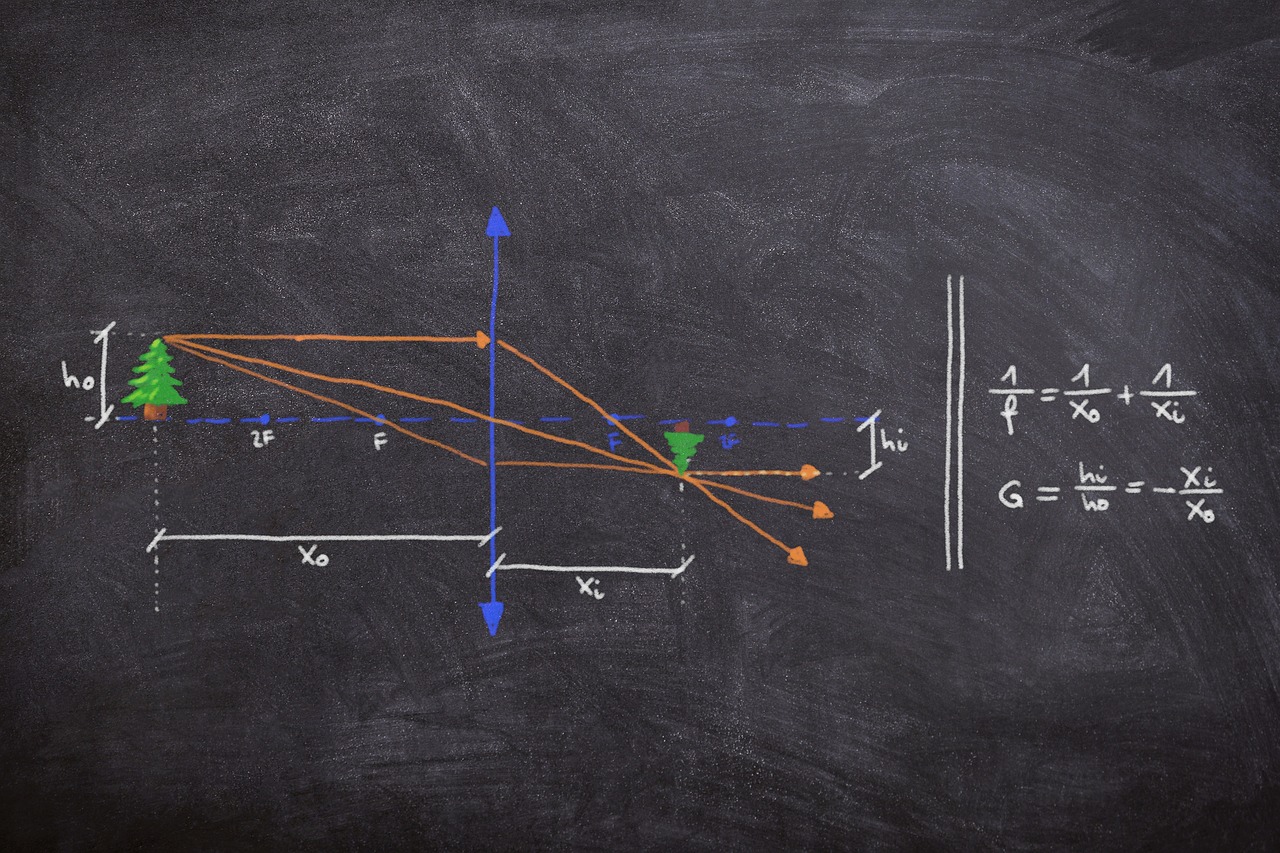
Critiques and Counterarguments
As we delve deeper into the fascinating realm of quantum consciousness theories, it's essential to recognize that this field is not without its fair share of skepticism and critique. Many scientists and philosophers have raised important questions about the validity of linking quantum mechanics to consciousness. The first major critique revolves around the lack of empirical evidence supporting these theories. Critics argue that while quantum phenomena are well-documented in physics, their application to consciousness remains largely hypothetical. This skepticism is not unfounded; after all, the scientific method thrives on observable and repeatable evidence. Without concrete data, many in the scientific community remain unconvinced.
Another significant point of contention is the complexity of quantum mechanics itself. Quantum phenomena, such as superposition and entanglement, operate on scales that are vastly different from our everyday experiences. This raises the question: can we truly apply these principles to the intricate workings of the human mind? Some argue that doing so is akin to trying to fit a square peg in a round hole. The leap from quantum physics to consciousness is not just a conceptual jump; it's a chasm that many believe cannot be bridged without a clearer understanding of both domains.
Moreover, there are concerns about the potential for misinterpretation of quantum mechanics. In popular culture, quantum mechanics is often sensationalized, leading to misconceptions about its implications. For instance, phrases like "quantum healing" or "manifesting reality through thought" can mislead the public into thinking that consciousness has a direct, manipulative power over the physical world, which many scientists vehemently oppose. This misrepresentation can dilute the rigor of scientific inquiry and lead to the proliferation of pseudoscience.
Additionally, some critics argue that quantum consciousness theories may inadvertently support a dualistic view of mind and matter, which has been largely discredited in contemporary philosophy. The idea that consciousness is somehow separate from the physical body runs counter to the materialist perspective that has dominated scientific thought for centuries. This raises a philosophical dilemma: if consciousness is a product of quantum processes, does that not imply a separation between mind and body, contrary to the prevailing view that they are inherently intertwined?
In light of these critiques, it's crucial to approach quantum consciousness theories with a healthy dose of skepticism and critical thinking. While the intersection of quantum physics and metaphysics is undeniably intriguing, we must ensure that our exploration is grounded in rigorous scientific inquiry. As we continue to investigate these theories, the dialogue between proponents and skeptics will undoubtedly shape our understanding of consciousness and its relationship to the universe.
- What is quantum consciousness? Quantum consciousness refers to theories that suggest a connection between quantum mechanics and the nature of consciousness, proposing that quantum processes may play a role in how we experience awareness.
- Why are scientists skeptical about quantum consciousness theories? Many scientists argue that there is insufficient empirical evidence to support the idea that quantum mechanics directly influences consciousness, and they caution against overextending quantum principles beyond their established realms.
- What are some examples of quantum consciousness theories? Notable theories include the Orch-OR theory, which posits that consciousness arises from orchestrated objective reductions of quantum states within neuronal microtubules.
- Can quantum mechanics and classical physics coexist in understanding consciousness? Some researchers believe that while quantum mechanics offers unique insights, classical physics still provides a foundational framework for understanding consciousness and its biological underpinnings.
Frequently Asked Questions
- What is quantum physics?
Quantum physics is a fundamental branch of physics that explores the behavior of matter and energy at the smallest scales, such as atoms and subatomic particles. Unlike classical physics, quantum physics introduces concepts like superposition and entanglement, which challenge our intuitive understanding of how the universe operates.
- How does quantum physics relate to metaphysics?
Quantum physics intersects with metaphysics by raising profound questions about reality, existence, and consciousness. As quantum theory challenges traditional views, it encourages a reevaluation of metaphysical concepts, suggesting that our understanding of reality may be more complex than previously thought.
- What is superposition and why is it important?
Superposition is a principle in quantum physics where a particle can exist in multiple states at the same time until it is observed. This concept is crucial for metaphysical discussions as it implies that reality may not be as fixed as we perceive, opening up debates about the nature of existence itself.
- Can you explain quantum entanglement?
Quantum entanglement refers to a phenomenon where particles become interconnected in such a way that the state of one particle instantly influences the state of another, regardless of distance. This challenges our understanding of separateness and interconnectedness, prompting philosophical inquiries into the nature of relationships and reality.
- What are the implications of quantum theory on free will?
Quantum theory introduces complexities to the debate on free will versus determinism. Some argue that the randomness inherent in quantum mechanics allows for a form of free will, while others contend that it complicates the deterministic view of the universe, leading to ongoing philosophical discussions.
- How does quantum physics influence our understanding of consciousness?
Some theories propose that consciousness may play a role in the manifestation of reality, suggesting that our awareness could influence quantum events. This challenges materialistic views and prompts a deeper exploration of the relationship between consciousness and the physical world.
- What is the Orch-OR theory?
The Orch-OR theory, proposed by physicists Roger Penrose and Stuart Hameroff, posits that quantum processes are fundamental to understanding consciousness. It suggests that consciousness arises from quantum computations in the brain, creating a bridge between quantum physics and our understanding of conscious experience.
- Are there criticisms of quantum consciousness theories?
Yes, many in the scientific community are skeptical of the idea that quantum mechanics directly influences consciousness. Critics argue that the connection is tenuous and that more empirical evidence is needed to substantiate these claims, highlighting the challenges of integrating quantum physics with metaphysical concepts.


